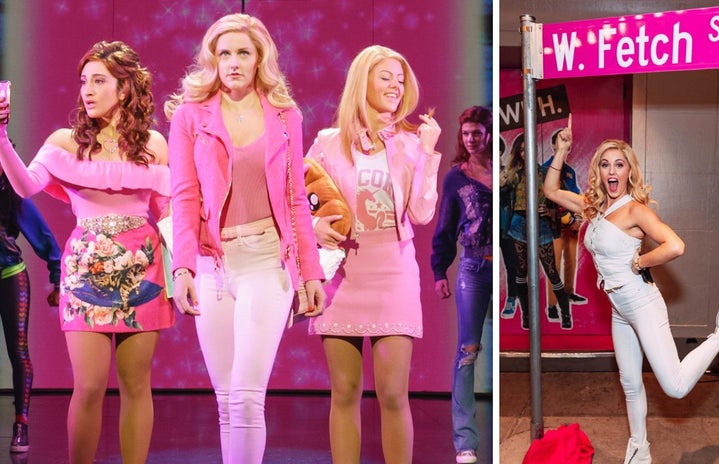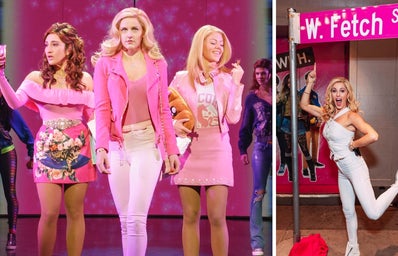“Mean girls”
Most of us, especially among our Her Campus readers, have heard this phrase many times before. It is commonly used to uplift us: “oh they are just mean girls” … “pay no mind to mean girls.” That is usually met with a shrug. Why are these mean girls so mean to me? Adversely, the other times we hear it, we are consumed with joy, laughter, or simply a reliable smile, for “Mean Girls” is also the title of, at least in my opinion, one of the most iconic films of the 21st century.
So why do I give this film such high praises? Well, first of all, I am not alone. It is ranked as the #1 Teen Movie of the 2000s by Ranker.com, it is listed as the 2nd best chick flick of the 2000s by Screenrant.com, and let’s face it, most kids today have seen/heard of this film, 17 years after its release, and we all plan to introduce our kids to it as soon as they become of age. Now, let’s deconstruct why this film is still so popular and well, relevant.
Firstly, as the great filmmaker Alfred Hitchcock once said, it only takes three things to make a good film- the script, the script, and the script. That being said, the script of Mean Girls is excellent. Tina Fey was able to write a comedic masterpiece that consists of jokes that are simply too good to get old. A high school film such as this one, is usually made for teenagers and pre-teens (see modern flicks like “The Kissing Booth”, 2018 and “To All the Boys I’ve Loved Before”, 2018). They are popular with that age group for a while and then they die, making way for new films just like it- but not Mean Girls. Tina Fey wrote a film that was funny to everyone- teenagers and their parents. The many great jokes in this film are not immature or silly- they are well thought out, consistently relevant and easily respected/enjoyed by the grown-ups in the movie theatre. Take the moment when Ms. Norbury mistakenly assumes the black girl in her class is the new African student, and the girl replies, “I’m from Michigan.” Hilarious. Then and now, to everyone. Also, as we know, a film that is also enjoyed by grown-ups…tends to have a longer life…
Secondly, the whole high school/ ‘mean girls’ theme was done many times before Mean Girls, but the difference is- it is an extremely original and highly intellectual satire of the idea, and it deconstructs the theme by the end. Mean Girls? Intellectual? Let me explain. Consider the “not like other girls” trope (see- “She’s All That”, 1999, “The Princess Diaries”, 2001), where there is a well-meaning, but awkward girl who is always bullied by a set of popular, more conventionally cool, mean girls. At first, the film wants you to believe that this is Cady- and to a comically exaggerated level. She is from ‘Africa’ (note- country not specified), has been home-schooled all her life, and has limited knowledge of modern pop culture. Tina Fey sets us up for a classic ‘not like other girls’ film- but Mean Girls then, of course, takes us to new places. Cady becomes one of them, and the film brilliantly demonstrates the process of corrupting her and the process of corruption, in general. The Plastics begin by teaching her the rules- ones that she must follow or…. else? When she gets a taste of the privilege and the power of subscribing to such a system, she believes in the rules herself and they take her to the path of becoming a ‘mean girl’. In the end, thankfully, her character is broken down once more, and the ‘mean girl’ group fades away. The truth is, anyone can be a mean girl. Any young, inexperienced, insecure gal (which at a point, we all have been) can become the ‘mean girl’ that the film industry loves to write about.
And…who is the hero in the film? Who is the character who guides Cady and the audience through this? Herein lies my favourite aspect of Mean Girls: its subtle feminism. The hero is Ms. Norbury- the only explored, adult, female character in the show, who has probably been through this ‘mean girls’ crap before. At first look, this looks like a movie which is all about girls vs girls, and to a great extent, it is (movie-goers loved and still love that dangerous theme). But the one who sees through the nonsense of mean girls and high school drama, is the intelligent, adult, hard-working, realistic woman in the film. Mean Girls puts a smart woman next to the madness that is a high school flick, lets you believe she is simply a pathetic, comic-relief, teacher at first, and then reveals that she is the only character who can fix this mess. The male principal tried and failed. She understands and points out the misguidedness and immaturity of the way in which girls treat each other. As she states (after the girls truly reach a peak of hate and violence)- slut-shaming each other only makes it okay for guys to slut-shame girls. We have to stick together. Mean Girls assures us, albeit in a dramatized way, that high school is high school, and you will become that brilliant, strong, talented woman who has learned the best lesson about how we must treat our fellow women- we must support each other.
At the end, when all the girls seem to learn this lesson, Cady and her pals notice a new, younger group of Plastics. The film deconstructs the idea of ‘mean girls’, has everybody join together, friendly and peaceful, and then presents that one shot- which shows that there will always be young gals who become mean girls. But as we know, they’re misguided now, they can grow out of being mean girls, they will hurt and be hurt, and then become different people- and watching that process, if Tina Fey writes it, will be very, very funny and can last generations.



